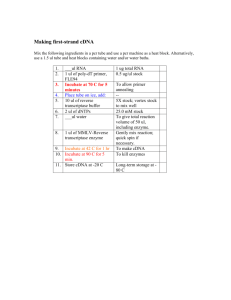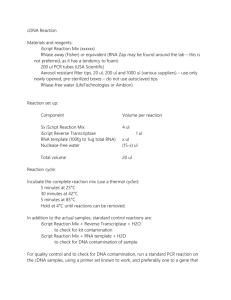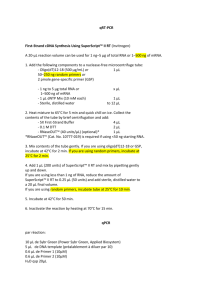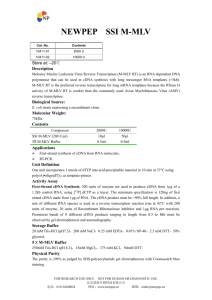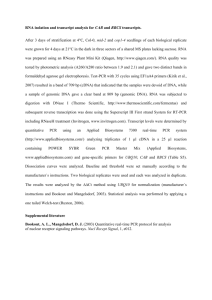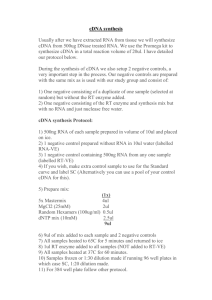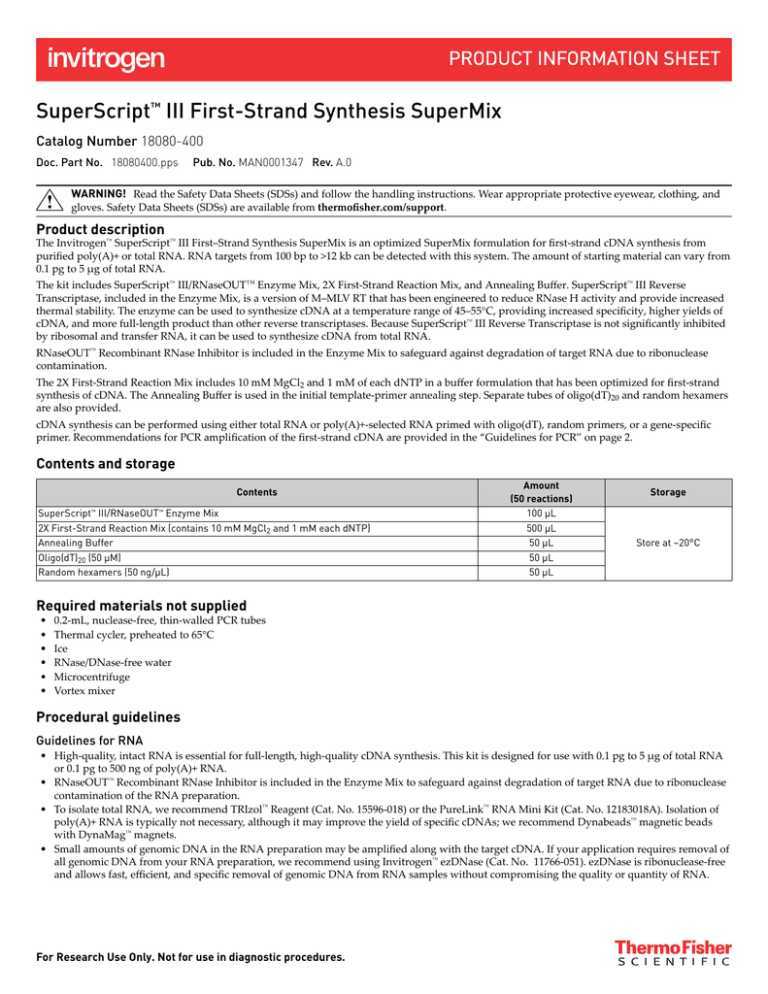
PRODUCT INFORMATION SHEET
SuperScript™ III First-Strand Synthesis SuperMix
Catalog Number 18080-400
Doc. Part No. 18080400.pps
Pub. No. MAN0001347 Rev. A.0
WARNING! Read the Safety Data Sheets (SDSs) and follow the handling instructions. Wear appropriate protective eyewear, clothing, and
gloves. Safety Data Sheets (SDSs) are available from thermofisher.com/support.
Product description
The Invitrogen™ SuperScript™ III First–Strand Synthesis SuperMix is an optimized SuperMix formulation for first-strand cDNA synthesis from
purified poly(A)+ or total RNA. RNA targets from 100 bp to >12 kb can be detected with this system. The amount of starting material can vary from
0.1 pg to 5 μg of total RNA.
The kit includes SuperScript™ III/RNaseOUT™ Enzyme Mix, 2X First-Strand Reaction Mix, and Annealing Buffer. SuperScript™ III Reverse
Transcriptase, included in the Enzyme Mix, is a version of M–MLV RT that has been engineered to reduce RNase H activity and provide increased
thermal stability. The enzyme can be used to synthesize cDNA at a temperature range of 45–55°C, providing increased specificity, higher yields of
cDNA, and more full-length product than other reverse transcriptases. Because SuperScript™ III Reverse Transcriptase is not significantly inhibited
by ribosomal and transfer RNA, it can be used to synthesize cDNA from total RNA.
RNaseOUT™ Recombinant RNase Inhibitor is included in the Enzyme Mix to safeguard against degradation of target RNA due to ribonuclease
contamination.
The 2X First-Strand Reaction Mix includes 10 mM MgCl2 and 1 mM of each dNTP in a buffer formulation that has been optimized for first-strand
synthesis of cDNA. The Annealing Buffer is used in the initial template-primer annealing step. Separate tubes of oligo(dT)20 and random hexamers
are also provided.
cDNA synthesis can be performed using either total RNA or poly(A)+-selected RNA primed with oligo(dT), random primers, or a gene-specific
primer. Recommendations for PCR amplification of the first-strand cDNA are provided in the “Guidelines for PCR” on page 2.
Contents and storage
Contents
SuperScript™ III/RNaseOUT™ Enzyme Mix
2X First-Strand Reaction Mix (contains 10 mM MgCl2 and 1 mM each dNTP)
Annealing Buffer
Oligo(dT)20 (50 μM)
Random hexamers (50 ng/μL)
Amount
(50 reactions)
100 μL
500 μL
50 μL
50 μL
50 μL
Storage
Store at –20°C
Required materials not supplied
•
•
•
•
•
•
0.2-mL, nuclease-free, thin-walled PCR tubes
Thermal cycler, preheated to 65°C
Ice
RNase/DNase-free water
Microcentrifuge
Vortex mixer
Procedural guidelines
Guidelines for RNA
• High-quality, intact RNA is essential for full-length, high-quality cDNA synthesis. This kit is designed for use with 0.1 pg to 5 μg of total RNA
or 0.1 pg to 500 ng of poly(A)+ RNA.
• RNaseOUT™ Recombinant RNase Inhibitor is included in the Enzyme Mix to safeguard against degradation of target RNA due to ribonuclease
contamination of the RNA preparation.
• To isolate total RNA, we recommend TRIzol™ Reagent (Cat. No. 15596-018) or the PureLink™ RNA Mini Kit (Cat. No. 12183018A). Isolation of
poly(A)+ RNA is typically not necessary, although it may improve the yield of specific cDNAs; we recommend Dynabeads™ magnetic beads
with DynaMag™ magnets.
• Small amounts of genomic DNA in the RNA preparation may be amplified along with the target cDNA. If your application requires removal of
all genomic DNA from your RNA preparation, we recommend using Invitrogen™ ezDNase (Cat. No. 11766-051). ezDNase is ribonuclease-free
and allows fast, efficient, and specific removal of genomic DNA from RNA samples without compromising the quality or quantity of RNA.
For Research Use Only. Not for use in diagnostic procedures.
Guidelines for cDNA synthesis reactions
• For difficult or high GC-content templates, use a 55°C cDNA synthesis temperature.
• Keep all components, reaction mixes, and samples on ice. After preparation of the annealing mixture, transfer the mixture to the preheated
thermal cycler.
Guidelines for primers
First-strand cDNA synthesis can be primed using random hexamers, oligo(dT), or gene-specific primers (GSPs):
• Random hexamers are the most nonspecific priming method, and are typically used for difficult or high GC-content mRNA. Using random
hexamers, all RNAs in a population are templates for first-strand cDNA synthesis, and PCR primers confer specificity during PCR.
Note: For most RT-PCR applications, 50 ng of random hexamers per 5 μg of total RNA is adequate. Increasing hexamers to 250 ng per 5 μg of
RNA may increase yield of small PCR products (<500 bp), but may decrease the yield of longer PCR products and full-length transcripts.
• Oligo(dT), a more specific priming method, is used to hybridize to 3¢ poly(A) tails, which are found in the vast majority of eukaryotic mRNAs.
Since poly(A)+ RNA constitutes approximately 1−2% of total RNA, the amount and complexity of cDNA is considerably less than with random
hexamers. We recommend using the oligo(dT)20 provided in the kit.
Note: Oligo(dT) is recommended over random hexamers or GSPs for new mRNA targets. Oligo(dT) produces an RT-PCR product more
consistently than random hexamers or GSPs.
• The most specific priming method uses a gene-specific primer (GSP) for the sequence of interest. First-strand synthesis can be primed with the
PCR primer that hybridizes nearest to the 3¢ terminus of the mRNA. Note that some GSPs fail to prime cDNA synthesis even though they work
in PCR on DNA templates. If gene-specific priming fails in RT-PCR, repeat first-strand synthesis using oligo(dT) as the primer.
Guidelines for PCR
The first-strand cDNA from the synthesis reaction may be amplified directly using PCR. We recommend using 10% of the first-strand reaction
(2 μL) for PCR. However, for some targets, increasing the amount of first-strand reaction to up to 10 μL may result in increased product yield.
We recommend the following DNA polymerases (see “Ordering information” on page 4):
• Platinum™ Taq DNA Polymerase provides automatic hot-start conditions for increased specificity and sensitivity. It is recommended for targets
up to 4 kb.
• Platinum™ Taq High Fidelity DNA Polymerase provides increased fidelity and higher yields for targets up to 15 kb.
• Platinum™ Pfx DNA Polymerase possesses a proofreading 3¢ to 5¢ exonuclease activity and provides maximum fidelity for PCR. It is
recommended for targets up to 12 kb.
Consult the product documentation provided with each DNA polymerase for recommended protocols and optimization guidelines.
Documentation is also available on our website at thermofisher.com/support.
Synthesize first-strand cDNA
The following procedure is designed to convert 0.1 pg to 5 μg of total RNA or 0.1 pg to 500 ng of poly(A)+ RNA into first-strand cDNA:
1. Mix and briefly centrifuge each component before use. Preheat the thermal cycler to 65°C.
2. Combine the following in a 0.2–mL, thin-walled PCR tube on ice:
Component
Up to 5 μg total RNA
Primer (50 μM oligo(dT)20, or 2 μM gene-specific primer, or 50 ng/μL random hexamers)
Annealing Buffer
RNase/DNase-free water
Amount
n μL
1 μL
1 μL
to 8 μL
3. Incubate in a thermal cycler at 65°C for 5 minutes, then immediately place on ice for at least 1 minute. Collect the contents of the tube by brief
centrifugation.
4. Add the following to the tube on ice:
Component
2X First-Strand Reaction Mix
SuperScript™ III/RNaseOUT™ Enzyme Mix
Amount
10 μL
2 μL
5. Vortex the sample briefly to mix, and collect by brief centrifugation. Incubate as follows:
• Oligo(dT)20 or GSP primed: 50 minutes at 50°C
• Random hexamer primed: 5–10 minutes at 25°C, followed by 50 minutes at 50°C
6. Terminate the reactions at 85°C for 5 minutes. Chill on ice.
7. Store the cDNA synthesis reaction at –20°C, or proceed directly to PCR.
2
SuperScript™ III First-Strand Synthesis SuperMix Product Information Sheet
Troubleshooting
Observation
Unexpected bands after
electrophoretic analysis
Possible cause
Contamination by genomic DNA
Recommended action
Pretreat RNA with ezDNase (Cat. No. 11766-051), as described in the
ezDNase documentation.
Design primers that anneal to sequence in exons on both sides of an
intron or at the exon/exon boundary of the mRNA to differentiate
between amplified cDNA and potential contaminating genomic DNA.
Nonspecific annealing of primers
Vary the annealing conditions. Use Platinum™ Taq DNA Polymerase for
automatic hot-start PCR.
Optimize magnesium concentration for each template and primer
combination.
No or faint bands after analysis of
amplified products
Primers formed dimers
Design primers without complementary sequences at the 3´ ends.
Procedural error in first-strand cDNA
synthesis
Repeat the procedure, being careful to follow each step. Be careful to
include the Annealing Buffer when adding primers and template for
optimal yield.
RNase contamination
Maintain aseptic conditions to prevent RNase contamination.
RNaseOUT™ is included in the Enzyme Mix to inhibit RNases.
Polysaccharide coprecipitation of
RNA
Precipitate RNA with lithium chloride to remove polysaccharides.
Target mRNA contains strong
transcriptional pauses
Use random hexamers instead of oligo(dT) in the first-strand reaction.
Increase the reaction temperature to 55°C.
Prewarm the 2X First-Strand Reaction Mix to 55°C and hold the primertemplate mixture at 55°C, then add the Enzyme Mix. Perform cDNA
synthesis at 55°C.
Use PCR primers closer to the 3' terminus of the target cDNA.
Too little first-strand product was
used in PCR
Use up to 10 μL of the first-strand reaction.
GSP was used for first-strand
synthesis
Try another GSP or switch to oligo(dT). Make sure the GSP is the
antisense sequence.
Inhibitors of RT present
Remove inhibitors by ethanol precipitation of mRNA preparation before
the first–strand reaction. Include a 70% (v/v) ethanol wash of the mRNA
pellet.
Note: Inhibitors of RT include sodium dodecyl sulfate (SDS), EDTA,
guanidinium salts, formamide, sodium pyrophosphate, and spermidine.
SuperScript™ III First-Strand Synthesis SuperMix Product Information Sheet
3
Ordering information
The following products are also available. Unless otherwise indicated, all materials are available through thermofisher.com.
Item
Amount
Source
100 units
10966-018
250 units
10966-026
500 units
10966-034
100 units
11304-011
500 units
11304-029
100 units
11708-013
250 units
11708-021
500 units
11708-039
50 reactions
12183018A
100 mL
15596-026
200 mL
15596-018
100 units
11766-051
To order, visit thermofisher.com/dynabeads and
thermofisher.com/magnets.
To order, visit thermofisher.com.
Platinum™ Taq DNA Polymerase
Platinum™ Taq High Fidelity DNA Polymerase
Platinum™ Pfx DNA Polymerase
PureLink™ RNA Mini Kit
TRIzol™ Reagent
ezDNase
Dynabeads™ magnetic beads with DynaMag™ magnets
Custom Primers
Limited product warranty
Life Technologies Corporation and/or its affiliate(s) warrant their products as set forth in the Life Technologies' General Terms and Conditions of
Sale found on Life Technologies' website at www.thermofisher.com/us/en/home/global/terms-and-conditions.html. If you have any questions,
please contact Life Technologies at www.thermofisher.com/support.
The information in this guide is subject to change without notice.
DISCLAIMER
TO THE EXTENT ALLOWED BY LAW, LIFE TECHNOLOGIES AND/OR ITS AFFILIATE(S) WILL NOT BE LIABLE FOR SPECIAL, INCIDENTAL, INDIRECT, PUNITIVE, MULTIPLE, OR
CONSEQUENTIAL DAMAGES IN CONNECTION WITH OR ARISING FROM THIS DOCUMENT, INCLUDING YOUR USE OF IT.
Revision history: Pub. No. MAN0001347
Revision
A.0
Date
24 May 2016
—
20 May 2010
Description
Updated products (ezDNase and Dynabeads™ magnetic beads)
Format, style, and legal updates
Baseline for this revision history
Important Licensing Information: This product may be covered by one or more Limited Use Label Licenses. By use of this product, you accept the terms and conditions of all
applicable Limited Use Label Licenses.
Corporate entity: Life Technologies Corporation | Carlsbad, CA 92008 USA | Toll Free in USA 1 800 955 6288
©2016 Thermo Fisher Scientific Inc. All rights reserved. All trademarks are the property of Thermo Fisher Scientific and its subsidiaries unless otherwise specified. TRIzol is a
trademark of Molecular Research Center, Inc.
For support visit thermofisher.com/support or email techsupport@lifetech.com
thermofisher.com
24 May 2016

